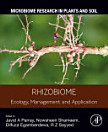Plant Endophytes and Secondary Metabolites
Acerca de este libro electrónico
Acerca del autor
Dilfuza Egamberdieva is a research associate at the Centre of Agricultural Landscape Research, Germany and head of Joint Uzbek-China Key Lab of Ecobiomes of Arid Lands, National University of Uzbekistan. Her research interests include microbial ecology and diversity, plant-microbe interaction, plant nutrition and stress tolerance, and plant biological disease control. She has been awarded the SCOPUS-2019 Award “Top Scientist of the Year, TWAS (The World Academy of Science) Award in Agricultural Sciences (2013), and TWAS-TWOWS-SCOPUS Young Women Research Award (2009), as well as several Fellowships such as President’s International Fellowship for Visiting Professors (PIFI), The Chinese Academy of Sciences (CAS), and the Georg Forster Research Fellowships, Alexander von Humboldt Foundation. She is a member of several journals’ editorial board, authored seven books published by Elsevier and Springer, and co-authored over 200 publications in per reviewed journals.
Javid A Parray is currently teaching at the Department of Environmental Science, GDCEidgah, affiliated with Cluster University, Srinagar. His research interests include ecological and agricultural microbiology, climate change, microbial biotechnology, and environmental microbiomes. He has also done his Post Doctorate Research from the University of Kashmir. Dr Parray was also awarded a Fast Track Young Scientist Project by SERB – DST, GoI New Delhi. Dr Javid was also awarded “Emerging scientist year Gold Medal for the year 2018 by the Indian Academy of Environmental Science. Dr Parray is the course coordinator for the UG- Programmes for CeC-MOOCS Swayam in Environmental Science. Dr Parray is an expert review member in the field of environmental science in the CSTT, Ministry of Education, GoI New Delhi.
Prof. Kakhramon Davranov is a Director of Institute of Microbiology, Uzbekistan Academy of Sciences. He is an expert on microbial physiology and biochemistry, and Lead a research laboratory on Microbial Biotechnology. He is also President of Uzbekistan Society of Microbiology. He authored or co-authored over 200 publications in national and International journals. He also authored several books related to Microbiology and Biotechnology, published by National Publisher in Uzbekistan.






